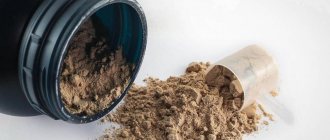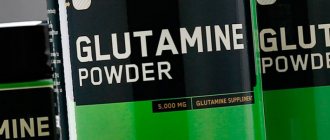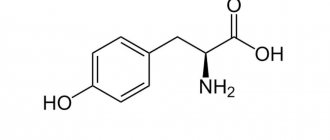Protein complexes[edit | edit code]
Protein complex (green curve)
Homemade protein shake
Complex proteins
is a mixture of different types of protein that provides a peak concentration of amino acids shortly after consumption, while at the same time slowly digestible proteins provide long-term muscle nutrition.
Components of protein complexes[edit | edit code]
Read the main article:
Types of protein by origin
It has been established that casein is absorbed more slowly than whey protein, gradually increasing the concentration of amino acids in the blood and maintaining it at a fairly high level for 6-8 hours. This property makes casein a long-term source of protein, maintaining a high concentration of amino acids in the blood throughout the day, but muscle growth causes a peak increase in concentration, so this property is only useful at night or when eating infrequently.
Whey protein, unlike casein, is absorbed by the body much faster, creating a powerful release of amino acids within a short period of time (30-40 minutes) and causing a maximum anabolic response. Therefore, whey protein is recommended to be taken before and after training to prevent muscle protein catabolism.
Egg protein occupies an intermediate position and also combines well with whey protein. In terms of biological value, efficiency factor, amino acid score, this is an excellent mixture that will saturate the blood immediately after training due to whey protein, and then maintain a high concentration of amino acids thanks to egg white.
A mixture of the three proteins listed above combines all the positive qualities and eliminates the disadvantages of each protein included.
Soy protein is most compatible with whey protein, which eliminates the disadvantages of the former. A combination of soy protein and egg protein is acceptable, but most often in this case the composition includes both casein and whey proteins.
Sometimes complex proteins are classified as slow proteins, since they contain slowly digestible proteins.
Who needs complex protein[edit | edit code]
Complex proteins are recommended for use both when gaining muscle mass and when losing weight and working on relief, but research suggests that the best effect is achieved when using whey protein, regardless of sports goals.
Protein complex – what are they made of and who needs it?
Combined protein is a combination of several types of protein (casein, whey and others), each of which has a unique list of properties and benefits.
A combination of egg, whey and casein protein is considered best for regular exercise. The composition of egg and whey proteins is enriched with essential amino acids (including BCAA). They are quickly absorbed and instantly fill the body with useful substances. Casein, on the other hand, is characterized by a slow rate of absorption, which allows it to evenly nourish the body within 6-8 hours after consumption.
You can often find soy protein in complex proteins, which saturates the body with arginine and increases the secretion of growth hormone.
Complex proteins are suitable for both gaining muscle mass and losing weight. Regardless of the athlete's goals, this supplement will complement the diet and will immediately demonstrate positive effects.
Time and frequency of administration[edit | edit code]
When gaining muscle mass
The ideal time to take complex protein is before bed, this will provide your muscles with amino acids throughout the night. It can also be consumed instead of whey 2 hours before training to replenish the amino acid pool. After training, it is better to take fast protein. Additionally, you can take a complete protein before long periods without food. So, for example, if you know that you won’t be able to eat in the next few hours, then be sure to drink a serving (30 g) of complex protein.
When losing weight
The dosage regimen is approximately the same as during weight gain: before bedtime, and before long periods without eating. In addition, complex protein can replace 1-2 meals. Portions for weight loss are half as large - about 15 g or 1/2 a standard serving.
Read the main article:
Calculation of daily protein needs
Read the main article:
Optimal time to take protein
Proteins for gaining muscle mass
As for gaining muscle mass with protein, everything is elementary. The process of building muscle mass mainly occurs during recovery. As a result of training, muscle fibers received stress (microtears, microtraumas). During the rest period, when a person does not train, the process of muscle recovery occurs. At the site of their tear, new fibers are synthesized.
This process occurs when the body has the resources to build new tissue. As we all know, the main resource for building muscles is protein, or scientifically called protein. Protein is the building material for muscles and muscle growth is simply impossible without a sufficient amount of protein. Although here the authors of the article allowed themselves to lie.
If you dig deeper, the protein itself consists of the amino acids BCAA, which in turn consists of the amino acids valine, leucine and isoleucine. Let's take a closer look at the properties of each amino acid:
- Leucine. Promotes a slight decrease in blood sugar levels, while enhancing the production of growth hormone. Helps accelerate the recovery of muscle tissue, skin and bones. Suppresses the breakdown of proteins and glucose. Enhances insulin production. Ensures the maintenance of the necessary water balance in the body.
- Isoleucine. Helps reproduce hemoglobin. Increases the athlete's endurance and restores damaged muscle tissue. Increases stress resistance. Disintegrates in muscle tissue releasing energy. Balances blood sugar levels.
- Valin. Needed to restore muscle tissue and more. Accelerates the healing of microdamages. Positively affects the nitrogen balance of the body.
The body needs them during the recovery period. Not forgetting, of course, about the transport elements that provide energy - carbohydrates, complex in the general diet and fast, for example, a banana, in order to quickly replenish energy reserves right before an increased load. How to take protein to gain muscle mass is written on the packaging of your protein. But on average, protein is taken in the morning, after training, and before bed. Also, if you don't have the opportunity to eat during the day, a protein shake will be a great snack option. But remember, sports supplements should not exceed 40-50% of your total daily diet.
Naturally, the athlete’s body requires increased replenishment of vitamins, minerals, and healthy fats. Only by maintaining the balance of all substances and maintaining a calorie surplus at the proper level will an athlete be able to gain weight. Calorie surplus? An athlete must consume more calories every day than he expends, otherwise where will the energy come from to build muscles?
Several types of protein were mentioned above. It's time to look at all types of protein so that readers can decide on the choice of a sports supplement.
Disadvantages[edit | edit code]
Comparative studies have shown that whey protein has the maximum anabolic and thermogenic properties, so adding other types of protein to the product may worsen its anabolic properties. Moreover, West DW and Burd NA conclusively proved in 2011 that muscle growth is directly dependent on the rate of absorption. The higher the rate of absorption, the greater the rate of muscle growth.[1]
In addition, manufacturers very often add large amounts of soy protein to the composition at a very low cost, which has quite a few disadvantages.
The best complex proteins[edit | edit code]
- Syntha-6 from BSN is a very good price/quality ratio, but not the best choice in terms of protein percentage (only 50% - 22 g per 44 g serving). Tastes great. The most popular complete protein.
- Matrix from Syntrax is an excellent price/quality ratio, affordable and effective complex protein.
- Combat Powder from MusclePharm is a high-quality product that contains different types of protein, but has average taste.
- Protein 80 Plus from Weider is a high-quality four-component protein. The obvious disadvantage is the overpriced price.
- Elite 12 Hour Protein from Dymatize is a budget option, one of the most inexpensive proteins, has poor taste and solubility.
- Professional Protein from Power System - excellent price/quality ratio, contains 5 types of protein. High-quality complex protein at a low price.
- MHP Probolic-SR is perhaps the best tasting complete protein available. However, a significant overpayment for the brand and soy in the composition shifts it down.
Top 5 Best Complete Proteins
Matrix 5.0 (Syntrax)
Matrix 5.0 from Syntrax is one of the most popular in its category and rightfully deserves first place. It contains only micellar casein as a “slow” protein, without the use of cheaper sodium and calcium caseinates. Good tastes and solubility at an adequate price, the presence of useful microelements in the composition, a varied protein matrix with glutamine peptides complement the list of advantages of this protein.
Syntha-6 (BSN)
Syntha-6 from BSN - contains 6 types of protein, and contains whey protein concentrate and hydrolyzate. An extensive range of flavors, and almost all tastes are good. From time to time, this particular protein is called the best-selling protein in this category. All good, but the 47 g serving contains only 22 g of protein, so it comes in second place.
Elite XT (Dymatize)
Dymatize is a reputable brand that produces high-quality proteins, including multi-component ones. Flavors available are vanilla and chocolate. Dymatize proteins usually have positive reviews, but the brand, which was initially declared as “budget”, has over time become not so affordable.
Professional Protein (Power System)
Professional Protein from Power System is a protein matrix of 5 components, the composition seems to be nothing special, a sort of strong average. However, good taste, solubility and affordable price allow it to take fourth place.
Combat (MusclePharm)
Combat from MusclePharm - has a matrix of five types of protein, and contains very little fat and carbohydrates - this is its main advantage. Mediocre tastes and a somewhat inflated price do not allow us to claim a place higher than fifth.
Is it advisable to take a complete protein or can you get by? Based on the above, we can conclude: the different rates of absorption of several types of protein in one protein are the only, but quite important, advantage of multicomponent proteins. This type of sports nutrition has certain prospects; the idea behind it is correct.
However, the combination of whey protein and casein in the diet is quite capable of replacing it; the difference in performance compared to the whey + multicomponent proteins pair will be vanishingly small. The average athlete can easily do without using complex protein, provided there is a sufficient load of whey and casein.
Top 10 Best Whey Proteins
How to Choose a Protein Based on its Protein Source
To gain muscle mass or dry muscles (the process of reducing fat mass while maintaining muscle volume), protein supplements are used, varying in the source of protein. Athletes use whey, egg, soy isolate, casein and complex protein.
Whey Protein
It is considered the best in terms of the value of its biological composition. It is a protein obtained from the whey produced during cheese making. Its composition is quite rich: vitamins A, B2, PP, organic acids, minerals - iron, iodine, phosphorus.
According to the degree of purification and method of production, it is divided into types:
- Concentrate is a popular product among bodybuilders. Not the cleanest, but not the most expensive either. Contains 80% protein and 20% other nutrients and vitamins. Dry whey helps quickly build muscle mass, removes toxins and excess fluid from the body. The concentrate is taken daily after training, but it is not recommended for drying muscles. Satisfies hunger, indispensable for those who adhere to a diet. Easily diluted with water and convenient to use.
- Isolate is whey protein without carbohydrates and fats, does not contain lactose, almost pure protein. Quickly reduces weight, approved for drying. It is supplemented with amino acids and vitamins.
- Hydrolyzate is an expensive whey protein that is partially fermented by pancreatin. A pure, easily digestible product, its breakdown speed is a maximum of 30 minutes. It sharply increases insulin in the blood and is more suitable for weight gain than for weight loss.
Egg white concentrate is difficult to find; few manufacturers produce it. Like whey, it contains a minimal amount of sugar and fat and quickly builds muscle mass.
Soy protein
Soy isolate contains 92% protein on a dry weight basis. Very popular among bodybuilding professionals. The price of the supplement is low, but the growth rate of muscle mass is also small.
It is believed that soy protein has an effect on the body's hormonal levels - it reduces the secretion of testosterone and increases the secretion of estrogen (the female sex hormone), which leads to the growth of female breasts in men, the accumulation of fat in the abdomen and thighs. But this issue still causes controversy and disagreement.
Casein protein
Once in the stomach, casein forms a curdled clot. Its main functions:
- slows down the process of protein digestion;
- suppresses appetite;
- nourishes muscle tissue with amino acids for a long time.
Since casein slows down the breakdown of protein, it is not enough to gain muscle mass. It is recommended to take “fast” protein separately, for example, whey.
Complete protein
This type of protein is created on the basis of natural components (extracts, amino acids, vitamins). It activates metabolic processes in the body during exercise, but it does not have any special benefits.
Which protein is better?
Now that we know that there are a huge number of types of protein, a reasonable question arises: what to choose, which protein is better? We have already decided by origin (plant or animal). Next, the criterion for our choice will be the speed of assimilation. Just like carbohydrates, protein foods travel at different speeds through the gastrointestinal tract. What matters is the time from the moment you swallow the food until the nutrients from that food enter the bloodstream. In the case of protein, these nutrients are amino acids.
If you train with weights, it is necessary to maintain high levels of amino acids in the blood at all times.
This will ensure the synthesis of new muscle structures and cells. Conversely, a low level of amino acids, and even significant fluctuations during the day, will negate your efforts in gaining muscle mass.
Let's say you ate a piece of beef. The processes of digestion and absorption will be long, and amino acids will enter the bloodstream no earlier than after a couple of hours. But what if you just worked out and your muscles need amino acids right now!? It is precisely at such moments that it is wise to use protein with a high absorption rate.
But here is another situation: it is known that in the next 6-7 hours you will be busy and you will not have the opportunity to eat. If you eat a few chicken eggs before this, they will be digested quickly, it will take 1-2 hours, and all subsequent time your body will experience a lack of amino acids. In this case, it is advisable to drink a protein shake with a long absorption time.
Whey Protein
Whey protein is characterized by high manufacturing standards and contains the entire complex of amino acids essential for the human body. The protein norm is an individual indicator; most often it varies depending on age, weight category, gender, degree of activity during the day and other factors.
Whey protein is a valuable source of basic amino acids BCAA, which are classified as essential. During active exercise and strength training, it is extremely important for our body to receive large amounts of these amino acids. Low levels of BCAAs in the body lead to signs of fatigue, decreased activity and slower metabolic processes.
Whey protein is suitable for the following categories:
- people following a special low-carbohydrate diet (whey protein contains a minimum of cholesterol);
- women during pregnancy and lactation;
- vegetarians who consume milk;
- persons with lactose allergies;
- people with gluten allergies;
- persons with digestive problems (whey protein is absorbed by the body as quickly and easily as possible).
There are 2 types of whey protein in sports nutrition:
- Whey protein concentrate, which contains up to 80% protein (depending on product and brand). It has a reduced amount of carbohydrates.
- Whey protein isolate. The most purified protein, more than 90% protein in the composition. The low level of carbohydrates and fats puts this protein in a worthy position in the choice of sports nutrition. For this reason, it is considered one of the most expensive products.
Egg protein (EGG)
Egg protein is made from eggs, most often during production the yolk is separated from the white and the protein is made from the white, dried and pasteurized. 1 scoop of egg white contains the same protein value as six chicken eggs from which the yolks have been removed; if we consider a whole egg, then about three eggs are comparable, but this is already 121 kcal more, this may not be suitable for those with strict diet.
Egg Protein Benefit:
- All protein obtained from egg white is absorbed 100%
- Significantly reduces hunger
- Suitable for use throughout the day
- The type of protein is suitable for those who do not like dairy products
Disadvantages of egg white:
- Foams a lot
- Absorbed after 2-3 hours after consumption
- Price
The advantage of chicken eggs:
- In addition to protein, they saturate the body with the amino acids and fats we need.
Disadvantages of chicken eggs:
- When eating raw eggs, the protein will be absorbed by half at best.
- To get the required amount of protein, you need to eat a large number of eggs, which not everyone can do.
MILK PROTEIN:
During the production of cheese and cottage cheese, a by-product remains in the form of whey. Previously, it was simply drained. Now all the valuable and nutritious substances of whey are used to make whey protein. And the proteins that remain in the cottage cheese are used to make casein. The main difference between whey protein and casein is the speed of absorption:
- Whey protein promotes the growth of muscle tissue, that is, it is a good anabolic steroid. It very quickly provides powerful support with the necessary amino acids to our muscles, so as a rule it is taken 30-40 minutes before training or 30-40 minutes after training. There is also another option for taking it: in the morning, immediately after waking up, as an “ambulance” to our muscles against the destructive effects of cortisol (a stress hormone that destroys muscle tissue), which is active from 6 to 10 am. The working time of whey protein is 1-2 hours. There are three types of whey protein on the sports nutrition market: concentrate, isolate and hydrolysate. Their difference is only in the degree of purification. The most popular type is isolate due to its milder taste, and it also contains a minimum of fat and lactose. Contents in one serving (30 grams): proteins – 22-24 g, fats – 2-2.2 g, carbohydrates – 2.1-2.3 g, Kcal – 110-120.
- Casein prevents the breakdown of muscle tissue, that is, it is an excellent anti-catabolic. This is the “slowest” type of protein, the active work of which lasts up to 6 hours, supplying the necessary amino acids to the muscles evenly throughout the entire time. That is why casein is taken before bed, which provides protection against the breakdown of muscle tissue almost throughout the night. Another option for taking casein is as a snack if eating in the next few hours is impossible for some reason. Due to these properties, casein is especially useful:
- for older people as a long-lasting source of amino acids - the main building material for muscles,
- for people who want to lose weight, as it gives a feeling of fullness for several hours.
SportExpert Whey protein, 908 g, Evalar
1 575 ₽
Dietary supplement NOT A MEDICINE
Contents in 1 serving (32 grams): proteins – 24-26 grams; fats – 0.5-1 g; carbohydrates – 2-3 g; Kcal – 118-120. It is best to combine these two proteins: whey taken in the morning and after training, casein - at night or in case of long breaks between meals.
Protein Casein Protein, Belgian chocolate flavor, 908 g, QNT
2 239 ₽
Dietary supplement NOT A MEDICINE
Casein protein (CASEINE)
Unlike whey protein which we take during the day, casein protein must be taken at night as it is long digestible. Casein protein takes about 8 hours to digest, so everyone takes it 2-3 hours before bed. It must be taken at night so that our body is constantly fed with long-acting protein throughout the night. It enters our stomach and turns into a kind of gel, after which it begins to slowly break down, due to which it prevents the catabolic effect. Casein is made from the same whey as whey protein, but one part of it is used to make whey protein, and the other part is used to make casein protein.
Benefits of Casein Protein
- Ideal for taking at night
- Lasts for quite a long time
- High calcium content
- Suppresses hunger for quite a long time, unlike whey protein
Disadvantages of Casein Protein
- Absorbed in about 8 hours
- Not suitable for use during the day
- Not ideal taste
How to take different types of protein
Today, there are several types of protein mixtures, each of which has its own characteristics in terms of intake time and serving size.
| Type | Advantages | Working hours | Absorption rate | Biological value | Recommended serving | Time of receipt |
| Whey | Relatively inexpensive, mixes well with liquid, has a powerful amino composition, and is quickly absorbed | 1-2 hours | 10-12 grams/hour | 90-95% | 30 grams | Morning, before and after training |
| Whey hydrolyzate | One of the best sources of quality protein | Up to 1 hour | 20-25 grams/hour | 99-100% | 25-30 grams | Before and after training |
| Casein | Long operating time, slower breakdown into amino acids | 4-10 hours | 4-6 grams/hour | 75-85% | 35 grams | Before bedtime |
| Lactic | A fairly inexpensive product that is a derivative of regular whey | 3-4 hours | 4-5 grams/hour | 85-90% | 35 grams | Between meals |
| Egg | Contains all the amino acids the body needs, as well as vitamins, minerals and other beneficial substances | 3-5 hours | 9-11 grams/hour | 99-100% | 30-35 grams | In the morning, before and after training |
| Soy | Long-term absorption, lowers cholesterol levels, great for the female body | 3-5 hours | 3-4 grams/hour | 70-75% | 35 grams | Between meals, after training |
| Complex | It is a mixture of balanced proteins with different rates of digestibility, suitable for any task. | Up to 8 hours | 5-8 grams/hour | 70-95% | 30 grams | Between meals, before and after training |
Types of protein and their differences
- Casein protein. Contains all types of amino acids that the human body cannot do without. It perfectly supplies muscle tissue with energy and plastic material, helps preserve muscles during dieting, and resists their destruction. The most important feature of casein for weight loss is that it suppresses appetite better than all other products, and at the same time does not cause any harm to the body. During the period of gaining muscle mass, use casein protein at night so that it nourishes the body most of the night.
- Whey Protein. It has high biological value and is a leader in the content of essential amino acids of the BCAA group. Compared to casein, it is quickly absorbed, metabolic processes are significantly accelerated, the body's energy needs increase, due to which rapid fat burning occurs. An important property is that it is more effective as an anabolic product than other types of protein supplements - it serves as a fast protein to prevent catabolism.
- Soy protein. A natural product of plant origin, which has a mild, delicate effect on the body. It is perfect for those who have allergic reactions to proteins of animal origin, and will also be a real godsend for vegetarians, because their diet cannot contain such valuable natural protein products as fish, meat, and cheese. The sports supplement also has anabolic and fat-burning properties and does an excellent job of improving immunity.
- Beef protein. An expensive type of squirrel. The main feature is the presence of an increased amount of creatine in the composition, which maintains the level of cell division at the desired level. Beef protein differs from whey protein in the absence of lactose and other carbohydrates. High absorption rate and rich composition of amino acids.
- Egg white. The speed of absorption is inferior to casein. However, it has an increased number of amino acids in its composition due to protein of animal origin.
- Vegan protein. A combined, plant-based product consisting of many proteins. They mainly combine pea, soy and rice protein, thereby creating a perfectly balanced product for vegetarian athletes.
- Complex protein. Same meaning as vegan. Sports nutrition brands combine animal proteins to create nutrient-dense products.
Let's move on to a detailed consideration of the types of protein for various tasks. To understand which protein is the best in your particular case.











